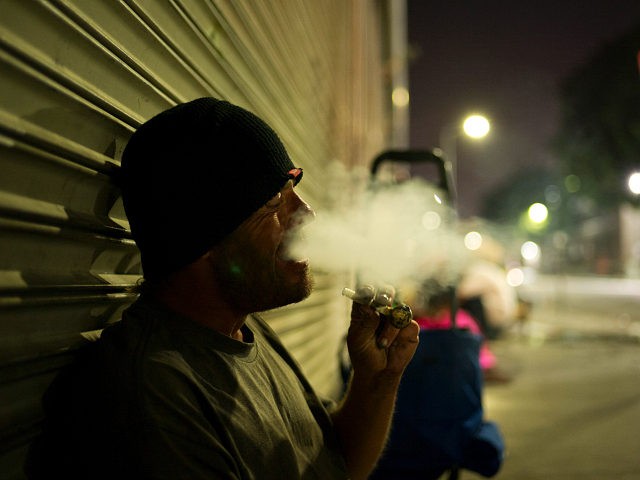The San Francisco health department confirmed on Wednesday that the city is “administering alcohol, tobacco, medical canabis and other substances in a effort to prevent a handful of people quarantined or isolating in city-leased hotels from going outside to get the substances themselves.”
The San Francisco Chronicle reported on the effort first noted by KTVU in the coronavirus era:
The hotel residents are also receiving medications such as methadone — delivered by methadone clinics — to tamp down heroin cravings. It’s all part of a widely used “harm reduction” approach to helping addicts stay inside and curb the spread of the novel coronavirus while coping with the loss or reduction of their core drugs.
The city-rented hotels have been reserved for individuals who either have COVID-19 or are at heightened risk of catching it, and who have no space of their own to safely self-isolate or quarantine. And some of those individuals have substance-abuse issues or are already on a methadone regimen.
The city’s health department is doing what it can to help those individuals through the duration of their self-isolation or quarantine period, said Jenna Lane, a spokeswoman for the Department of Public Health.
“They’re doing San Francisco a great service by staying inside,” Lane said in the Chronicle report. “We’re saying, ‘We’re doing what we can to support you staying inside and not have to go out and get these things.’”
Lane also said that “hotel guests” can have access to addiction treatment, clinicians, and social workers. She also said taxpayers are not paying for the substances and that private donations are footing the bill.
The Chronicle said there were about 270 people being housed in hotels. The Chronicle reported:
Those receiving substances from the health department represent a small subset — a few dozen people — of the population staying in hotel rooms to safely self-isolate or quarantine. Eleven of those under isolation and quarantine have received alcohol from the health department and around 27 have received tobacco, according to Lane. The health department helped five people coordinate delivery of medical cannabis to their hotels.
Lane said health workers are determining the proper amount of alcohol they are providing.
“For those guests, the DPH medical staff are calculating the minimum medically appropriate amounts of alcohol and distributing it with meals,” Lane said. “Alcohol withdrawal is the only one you can die from.”
The Chronicle included the remarks of one drug counselor who has a problem with the policy.
Thomas Wolf, a case manager who works with addicts in San Francisco, said:
I have it from a pretty reliable source that weed and booze are being given to people in the hotels, and I have a real problem with that. There’s an ethical issue there. Alcohol kills more people than any other drug. And I understand the risks of having people detox in hotel rooms, but my understanding is the people who are quarantined in the hotels can leave for 30 minutes for essential services.
“So if they have to get what they think they need, that’s what they should do. But don’t deliver it to them,” he said.
“We want them to stay inside, but, man, you’ve got to draw the line somewhere and ask for more accountability,” said Wolf, who was a homeless addict before getting sober and helping others. “Don’t be enabling people.”
I just found out that homeless placed in hotels in SF are being delivered Alcohol, Weed and Methadone because they identified as an addict/alcoholic for FREE. You're supposed to be offering treatment. This is enabling and is wrong on many levels. @SF_DPH @sfbos @LondonBreed
— T Wolf (@MyTwolffamily) May 2, 2020
@MyTwolffamily. Great job. Quoted on Fox News. San Francisco gives drugs, alcohol to homeless addicts in hotels during coronavirus, sparking debatehttps://t.co/XUJzTCifwP
— FoodieChix (@foodiechix) May 7, 2020
The Chronicle noted that Alameda, Santa Clara, and Contra Costa counties also use a “harm reduction approach in their hotels.”
“San Francisco Health Director Dr. Grant Colfax said the city’s approach was underpinned by “decades of (medical) literature” supporting harm reduction approaches to addiction management,” the Chronicle reported.
“Our focus is using the best evidence to help people manage their addictions,” Colfax said at a press conference on Wednesday. “In some cases, this will include helping them manage their alcohol and nicotine use so they can stay safe and in place as much as possible to help their communities and help themselves.”
Follow Penny Starr on Twitter

COMMENTS
Please let us know if you're having issues with commenting.